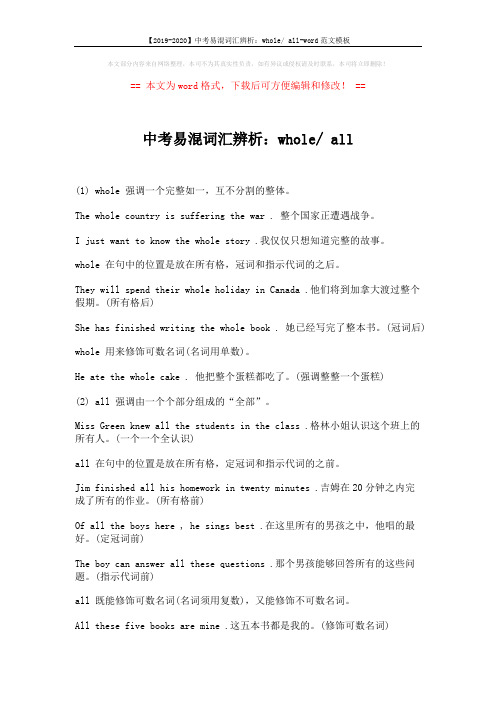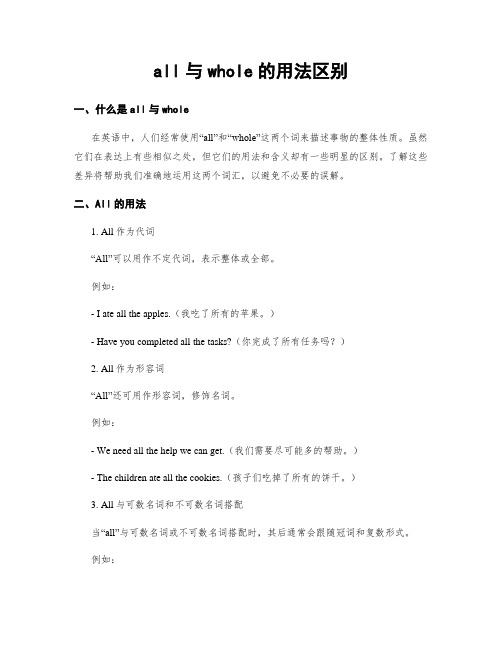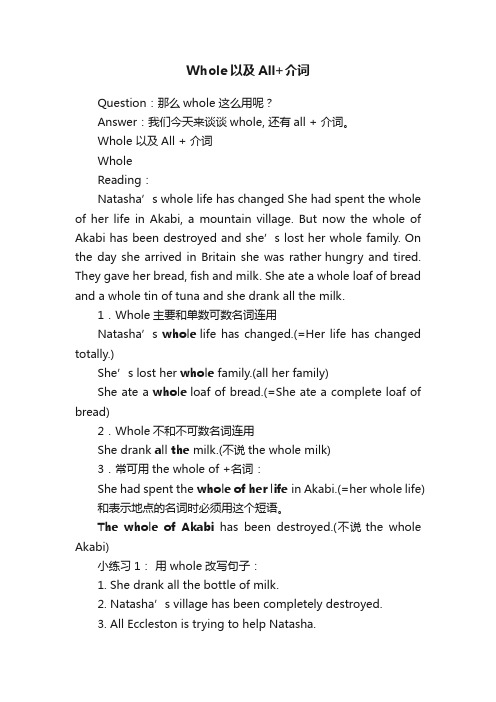whole和all的用法及区别
whole和all的用法及区别

whole和all的用法及区别:这两个词意思相近。
但与限定词和名词连用时,它们的词序各不相同。
有时这两个词大致同义,只是位置不同:all 要放在冠词、指示代词、物主代词等之前,而 whole 应放在这些词之后。
如:“all + 限定词 + 名词”“限定词 + whole + 名词”all the family / the whole family 全家all the time;the whole time 整个时间all my life; my whole life 我的一生all the class;the whole class 整个班级【注意】如名主词前没有限定词,不能用whole,如可以说all day,而不能说whole day。
1)all与 whole都可以和单数名词连用。
例如:①Mary spent all the summer at home.玛丽整个夏天都是在家里度过的。
也可以说成:②Mary spent the whole summer at home.③all my life我的一生=my whole life2)whole与all都可以和单数可数名词连用,但whole更为常见。
例如:④Mary wasted the whole lesson.(较 all the lesson更常见)玛丽把整整一堂课都浪费掉了。
⑤He ate the whole chicken.(较…all the chicken更常见)他把整只鸡都吃掉了。
3)all通常与不可数物质名词连用,而 whole则不能。
在不可数名词之前一般用 all,而不用 whole (偶尔有例外:the whole time / all the time; his whole energy / all hisenergy 等),但在物质名词前则绝对不用 whole。
如:误:the whole money 正:all the money 所有的钱误:the whole food 正:all the food 所有的食物误:the whole wine 正:all the wine 所有的酒⑥正:Jane has drunk all the milk.误:Jane has drunk the whole milk.珍妮喝光了所有的牛奶。
【2019-2020】中考易混词汇辨析:whole- all-word范文模板 (1页)

【2019-2020】中考易混词汇辨析:whole/ all-word范文模板本文部分内容来自网络整理,本司不为其真实性负责,如有异议或侵权请及时联系,本司将立即删除!== 本文为word格式,下载后可方便编辑和修改! ==中考易混词汇辨析:whole/ all(1) whole 强调一个完整如一,互不分割的整体。
The whole country is suffering the war . 整个国家正遭遇战争。
I just want to know the whole story .我仅仅只想知道完整的故事。
whole 在句中的位置是放在所有格,冠词和指示代词的之后。
They will spend their whole holiday in Canada .他们将到加拿大渡过整个假期。
(所有格后)She has finished writing the whole book . 她已经写完了整本书。
(冠词后)whole 用来修饰可数名词(名词用单数)。
He ate the whole cake . 他把整个蛋糕都吃了。
(强调整整一个蛋糕)(2) all 强调由一个个部分组成的“全部”。
Miss Green knew all the students in the class .格林小姐认识这个班上的所有人。
(一个一个全认识)all 在句中的位置是放在所有格,定冠词和指示代词的之前。
Jim finished all his homework in twenty minutes .吉姆在20分钟之内完成了所有的作业。
(所有格前)Of all the boys here , he sings best .在这里所有的男孩之中,他唱的最好。
(定冠词前)The boy can answer all these questions .那个男孩能够回答所有的这些问题。
(指示代词前)all 既能修饰可数名词(名词须用复数),又能修饰不可数名词。
all的用法

• (二).whole 与all 的区别: • whole与all都有“全部的”的意思,但其用法不同。二者之间的 区别是: • 1.两者都可以用在表示整体的单数名词之前,但与它们连用 的限定词的位置不同。 whole一般位于冠词、物主代词和别的限 定词之后,而all须位于这些词之前。例如: • We spent all the afternoon/the whole afternoon cleaning the classroom.我们花了整整一个下午打扫教室。 • All the city/The whole city are busy cle打扫街道。 • It took him all the year/the whole year to write the book. • 写这本书花了他整整一年的时间。 • [注] 如果被修饰的名词前面没有限定词,则不能用whole。 可以说all day,但不能说 whole day。 • 2.表示“所有的”的意思时,all后面接复数名词。例如: • All the students are here.所有的学生都到了。
18.一整天 (2种) 19.整个城市 20.整整5天 21.全班同学 (2种) 22.所有工人
all the water all day // the whole day the whole city five whole days all the class // the whole class all the workers
whole和all的用法

whole和all的用法整体和全部的用法一、整体的用法1. 作为形容词使用"整体"是一个表示事物全貌、总体或一切方面的形容词。
它用来描述一个事物的所有部分或成分在某一方面共同构成一个整体。
例如:- The company needs to take a whole new approach to marketing.(公司需要采取全新的市场营销方式。
)- The whole family gathered together for the holiday celebration.(全家人聚集在一起庆祝节日。
)2. 作为名词使用"整体"也可以作为一个名词,指代所有部分组合而成的东西或概念。
例如:- We need to consider the whole of the problem before making a decision.(我们在做决定之前需要考虑问题的全部。
)- The whole of the process was carefully planned and executed.(整个过程都经过了精心计划和执行。
)二、全部的用法1. 作为形容词使用"全部"是指所有可数或不可数事物中的每一个,表示事物中没有任何例外或遗漏。
它常用来描述所有可能相关的人或物,并强调包括了每个个体。
例如:- She ate all the cake by herself.(她一个人吃了整个蛋糕。
)- I have read all the books on this shelf.(我已经把这个书架上的所有书都读过了。
)2. 作为副词使用"全部"也可以作为一个副词,表示完全、整个地或彻底地。
它用来描述动作或状态的程度达到极限。
例如:- The team worked all night to finish the project.(团队通宵工作以完成这个项目。
同义词辨析:total、whole、all、entire

同义词辨析:total、whole、all、entire导航意思: 全部的total:解析: total只作定语,指所有的数目或东西都计算在内的,强调总的数字、数额、数量等。
例句: Her total debts are $800.翻译: 她的全部债务有800美元。
例句: The total shortage was 200 tons.翻译: 短缺总额为两百吨。
whole:解析: whole只作定语,一般只用于修饰单数名词(含集合名词),但前面须有冠词或其他限定词;侧重指某事物的整体,如全部数量、体积、时间等,强调毫无增删、遗漏等。
例句: Dad gave me the whole box of chocolates.翻译: 爸爸把一整盒巧克力都给了我。
例句: The whole village was attacked with influenza.翻译: 全村的人都得了流感。
all:解析: all普通用词,通常用于修饰单数或复数可数名词、不可数名词、物质名词、表示地点的专有名词,应置于冠词、指示代词、物主代词等之前,而 whole 应置于这些词之后。
例句: I want to hear all the details.翻译: 我想听听全部的细节。
例句: All children deserve encouragement.翻译: 所有的孩子都应得到鼓励。
entire:解析: entire较正式用词,只作定语,一般只用于修饰单数名词(包括集合名词),强调团体、时间段、数量等的整体,含不能有所削减或增添之意,用于修饰某一具体事物时常可与 whole 换用。
例句: I am in entire agreement with you.翻译: 我完全同意你的意见。
例句: The entire/whole body of a zebra is marked with black and white stripes.翻译: 斑马的全身都有黑白条纹。
whole与all的用法区别

wh l al 用法 区别 oe与 I 的
河 北 徐振芳
一
、 “
这 两个 词 意思相 近 。但 与 限定 词 和名词 连用 时 , 它们 的词 序 各不 相 同 。试 比较 :
a+ l 限定 词+ 词 ” “ l 名 与 限定 词+ h l 名 词 ” wo+ e
1a ) U与 w oe 可 以和 单数 名词 连 用 。例如 : hl都
Ma y s e t al t e 8 l l e t h me= r p n h o e s mme t h me r p n l h u' n r a o . Ma y s e t t e wh l u n r a o .
He h s is e d te wh l f Go e a u tra h oe o n W i h W id =… alo n Wi h W id t te h n. l fGo e t te h n.
语 差 他刚把《 全部看完 。 飘》 之 Id ntU d rtn h h l o a fi 这 件 事情 我并 不 完全 了解 。 o’ n es d tew oe f l o . a /l t 毫 厘 二 、 )hl 1w o e一般 位 于冠 词 、 所有 格 或别 的限 定词 之后 , a 位 于这 些词 之 前 。例 如 : 而 U须
Yo ale e d a wh l a h r . y
(hl 与可数 名词 连 用1你 可 以轻 松地 在 那里呆 上 一整 天 。 wo e多
但 有些 抽象 名词 前也 可 用 w oe h l。例 如 :
3 al 常与不 可数 物质 名 词连 用 , w oe则不 能 。例如 : )l通 而 hl 珍 妮喝 光 了所有 的牛 奶 。
all与whole

all,whole,entire,total1.all着重“整体”,指各个“个体”或各个“部分”组成的“全部的、所有的”整体。
修饰可数名词复数时,指所有的数量;修饰不可数名词时,指整个范围或全部数量。
位于定冠词、指示代词、物主代词、基数词的前面。
如:All that afternoon I jumped and sang and did all kinds of things.All the Chinese people are going all out for the realization of the four modernizations.全中国人民正全力以赴实现四化而奋斗。
常见短语有:all day,all night,all day long,all the morning,all the summer,all the year,all the month;all his books,all these sentences,all the people,all five men,all the students,all(the)horses,all animals;all the news,all the work,all China,all the world,all the city,all his life…注意:①英美人在all day,all night中常不用the。
其它情况下,美国人常不用the。
②all常可与whole互换,但whole位于定冠词,物主代词等之后。
如:all the afternoon the whole afternoonall the year the whole yearall the city the whole cityall the world the whole world③all与地点名词连用指人,whole指人指地区均可。
因此,whole指地区时,不能与all互换。
八年级上新目标fun 和 whole,all的用法

知识点小贴士1.fun 多用作名词,Eg, There is more fun in playing soccer than in playing cards.Let's have more fun.同时也可做形容词,一般不使用比较级和最高级,需要时可用more fun,most fun。
一般是用funny代替。
Funny 比较级和最高级是funnier, funniest Eg, Playing soccer is funnier than playing cards.小练习:判断下列fun的词性,并翻译句子1.It is great fun sailing a boat._______ ______________________________________2. She is great fun to be with_______ _______________________________________3.Riding the bike is a lot more fun than taking the bus_______ ______________________________________2.all 和whole的区别在结构方面:在限定词和名词的连用方面不同All+限定词+名词限定词+whole+名词Eg: 整个夏天:all the summer the whole summer在所连接的名词方面:1)复数名词前一般用all, 单数名词前一般用wholeAll the students/all students所有的学生my whole life 我的一生2)只有all 能和不可数名词连用Jane has drunk all the milk.3) 抽象名词可用wholeCan you tell me the whole truth?小练习:Are _______in the classroom?A.all the studentsB. the whole studentsC. whole the studentsD. all students。
辨析whole, all 配套课件

小结
1 all 修饰各类名词,限定词放后。
whole 修饰具有整体意义的单数名词,限定词放前。
2 all 可修饰专有名词。
whole 修饰专有名词时,一定要带of 。
3 all 可修饰复数可数名词。whole 不能修饰复数可数名词,
但是若复数可数名词前有具体的数量词时, 则可用whole 。
4 all 独立使用时, 在句中可以做主语,宾语和同位语。
all 独立使用时, 在句中可以做主语,宾语和同位语。 All are present. / I have finished all today. / I like them all. whole 独立使用时, 在句中可以做补语。 Roast ducks are ducks that roasted whole.
3. Could you tell me ______ story?
A. the whole B. whole the C. the all D. a all
即
时
练
习
4. I want to learn about all Chinese history. (同义句) I want to learn about _th_e__w_h_o_l_e_o_f_ Chinese history. 5. We spent all three days visiting Beijing. (同义句) We spent __th_r_e_e_w__h_o_le__ days visiting Beijing.
即
时
练
习
1. It took me a ____ day to repair the bike.
A. the whole B. whole
八年级上新目标fun+和+whole,all的用法

知识点小贴士1.fun 多用作名词,Eg, There is more fun in playing soccer than in playing cards.Let's have more fun.同时也可做形容词,一般不使用比较级和最高级,需要时可用more fun,most fun。
一般是用funny代替。
Funny 比较级和最高级是funnier, funniest Eg, Playing soccer is funnier than playing cards.小练习:判断下列fun的词性,并翻译句子1.It is great fun sailing a boat._______ ______________________________________2. She is great fun to be with_______ _______________________________________3.Riding the bike is a lot more fun than taking the bus_______ ______________________________________2.all 和whole的区别在结构方面:在限定词和名词的连用方面不同All+限定词+名词限定词+whole+名词Eg: 整个夏天:all the summer the whole summer在所连接的名词方面:1)复数名词前一般用all, 单数名词前一般用wholeAll the students/all students所有的学生my whole life 我的一生2)只有all 能和不可数名词连用Jane has drunk all the milk.3) 抽象名词可用wholeCan you tell me the whole truth?小练习:Are _______in the classroom?A.all the studentsB. the whole studentsC. whole the studentsD. all students。
英语语法:all与whole的用法

英语语法:all与whole的用法Atlantic 音乐: Sleeping At Last - Atlas: Oceans 关注微博:读外刊学英语英语语法:all与whole的用法1. 英语·语法·知识与运用易混形容词和副词辨析难点精讲1. all与whole的用法两者都可以翻译成“整个的”、“全部的”,其区别:1)修饰单数可数名词或者抽象名词时,它们可以互换,但是词的顺序不一样:all放在the, this, that, my, your等词的前面,whole则放在这些词的后面。
比如:She has worked all the afternoon.=She has worked the whole afternoon.她工作了整个下午。
结构分析:She是主语,has worked是谓语,现在完成时,all the afternoon是时间状语。
2)修饰复数可数名词时,all的意义是“所有的”,whole的意义是“整整的”,不可以互换。
比如:All students will go there for a meeting.所有的学生都将去那儿开会。
结构分析:All形容词(作前置定语)+students名词=是名词词组,作主语,will go是动词词组,作谓语,将来一般时,there是状语,for a meeting是状语。
It rained for two whole days.雨下了两天整。
结构分析:It是主语,rained是谓语,过去一般时,for two whole days是介词词组,作时间状语。
3)修饰地名时,whole不能直接跟地名。
比如:All Japan was surprised at the news.=The whole of Japan was surprised at the news.全日本听到那个消息都震惊了。
结构分析:All形容词(作前置定语)+Japan名词=名词词组,作主语,wassurprised at是动词词组,作谓语,过去一般时(was是is的过去式),the news名词词组,作宾语。
all与whole的用法区别

all与whole的用法区别一、什么是all与whole在英语中,人们经常使用“all”和“whole”这两个词来描述事物的整体性质。
虽然它们在表达上有些相似之处,但它们的用法和含义却有一些明显的区别。
了解这些差异将帮助我们准确地运用这两个词汇,以避免不必要的误解。
二、All的用法1. All作为代词“All”可以用作不定代词,表示整体或全部。
例如:- I ate all the apples.(我吃了所有的苹果。
)- Have you completed all the tasks?(你完成了所有任务吗?)2. All作为形容词“All”还可用作形容词,修饰名词。
例如:- We need all the help we can get.(我们需要尽可能多的帮助。
)- The children ate all the cookies.(孩子们吃掉了所有的饼干。
)3. All与可数名词和不可数名词搭配当“all”与可数名词或不可数名词搭配时,其后通常会跟随冠词和复数形式。
例如:- All the students are here today.(今天所有学生都来了。
)- She drank all of the milk.(她喝完了所有牛奶。
)三、Whole的用法1. Whole作为形容词“Whole”通常用来修饰名词,表示整体或全部。
例如:- I spent the whole day cleaning the house.(我花了一整天的时间打扫房子。
)- She ate the whole pizza by herself.(她一个人吃完了整个披萨。
)2. Whole与可数名词和不可数名词搭配与“all”不同,“whole”后面不需要使用冠词或复数形式。
例如:- The whole team is here for practice.(整个团队都在这里进行练习。
)- He drank the whole bottle of water.(他喝光了整瓶水。
Whole以及All+介词

Whole以及All+介词Question:那么whole 这么用呢?Answer:我们今天来谈谈whole, 还有all + 介词。
Whole 以及All + 介词WholeReading:Natasha’s whole life has changed She had spent the whole of her life in Akabi, a mountain village. But now the whole of Akabi has been destroyed and she’s lost her whole family. On the day she arrived in Britain she was rather hungry and tired. They gave her bread, fish and milk. She ate a whole loaf of bread and a whole tin of tuna and she drank all the milk.1.Whole主要和单数可数名词连用Natasha’s whole life has changed.(=Her life has changed totally.)She’s lost her whole family.(all her family)She ate a whole loaf of bread.(=She ate a complete loaf of bread)2.Whole不和不可数名词连用She drank all the milk.(不说the whole milk)3.常可用the whole of +名词:She had spent the whole of her life in Akabi.(=her whole life) 和表示地点的名词时必须用这个短语。
The whole of Akabi has been destroyed.(不说 the whole Akabi)小练习1:用 whole改写句子:1. She drank all the bottle of milk.2. Natasha’s village has been completely destroyed.3. All Eccleston is trying to help Natasha.All +介词Reading:There are refugees like Natasha all over the world. They know all about war and suffering. Natasha’s still so unhappy that she often cries all thr ough the night. She’d like to tell her friends in Eccleston all about her life in Akabi. But she can’t speak English yet.介词(about, along, down, over, round, through)前可用 allThere are refugees all over the world.(=over the whole world) They know all about war and suffering.(=everything about) 小练习 2:用 all +介词改写句子:1 There are refugees living everywhere in Britain.2 Natasha wants to tell people the whole story of her experiences.上期答案:1 every(penny)2 every(shop)3 each(shop)4 Each。
whole 的用法

whole 的用法一、整体的定义和用法整体(whole)是一个常见的英语单词,用于表示一个完整的单位、全部的部分或者一个完整的过程。
它可以表示事物的完整性,同时也可以用来作为形容词来修饰其他名词或在短语中使用。
二、整体作为名词的用法1. 表示一个完整的单位:当“whole”作为名词时,它指代了一个事物或概念的全体。
例如,“The whole team gathered for a meeting”(整个团队聚集开会)表明所有成员都参加了会议。
2. 全部部分:此外,“whole”还可表示系统或组织中所有成员或元素所组成的总体。
“The whole office attended the party.”(整个办公室都参加了派对。
)3. 完整行程/步骤:“Whole”也可以指代某个完全封闭且毫无遗漏的行程或步骤。
比如,“I have to go through the whole process again.”(我必须再次完成整个流程。
)三、整体作为形容词的用法1. 指代包括全部内容:当“whole”作为形容词时,它修饰名词,并表示该名词是无需除掉任何部分即可被视为完成或完美。
“He ate the whole pizza by himself.”(他独自吃完了整个披萨。
)这里的“whole”表示整个披萨被完全吃掉。
2. 整体性质:“whole”也可用来表示某事物具有整体性质,且不可分割。
“The whole population was affected by the natural disaster.”(整个人口都受到了自然灾害的影响。
)四、常见短语和表达方式1. As a whole: 这一表达方式指代的是整体而言,表示对所有部分或方面作出综合评价。
“As a whole, the project was a great success, despite some minor setbacks.”(总的来说,尽管有些小问题发生,这个项目非常成功。
新目标九年级词语辨析

新目标九年级词语辨析Unit 10Ⅰ. whole, all辨析:whole和all作为形容词,都有“整个的”、“完全的”意思,但用法略有不同。
1. 与复数名词连用时whole的意思是“整个的”,而all表示“所有的”,近乎“每一个”。
例如:It rained for five whole days. 雨下了整整五天。
All my books are kept here. 我所有的书(每一本书)都储存在这儿。
2. whole和all在句子中的位置不同。
whole紧接名词,放在the,或物主代词,或that 之后;all则放在the,或物主代词,或that之前。
例如:the whole time, her whole life, that whole morning; all the time, all her life, all that morning.3. whole用于专用名词前要用定冠词the,all则直截了当用于专用名词前,不用定冠词the。
例如:the whole China = all China练习:用whole或all填空。
1. The teacher said, “Forty is a ______ number.”2. Her ______ homework was finished with the help of the teacher.3. ______ her homework was finished with the help of the teacher.4. He spent ______day doing the work.5. He spent the ______day doing the work.参考答案:1. whole 2. whole 3. All 4. all 5. wholeⅡ. leave, forget辨析:leave和forget两者差不多上动词,都含有“不记得”的意思。
- 1、下载文档前请自行甄别文档内容的完整性,平台不提供额外的编辑、内容补充、找答案等附加服务。
- 2、"仅部分预览"的文档,不可在线预览部分如存在完整性等问题,可反馈申请退款(可完整预览的文档不适用该条件!)。
- 3、如文档侵犯您的权益,请联系客服反馈,我们会尽快为您处理(人工客服工作时间:9:00-18:30)。
whole和all的用法及区别:
这两个词意思相近。
但与限定词和名词连用时,它们的词序各不相同。
试比较:“all + 限定词 + 名词”
“限定词 + whole + 名词”
1)all与 whole都可以和单数名词连用。
例如:
①Mary spent all the summer at home.
玛丽整个夏天都是在家里度过的。
也可以说成:
②Mary spent the whole summer at home.
③all my life我的一生=my whole life
2)whole与all都可以和单数可数名词连用,但whole更为常见。
例如:
④Mary wasted the whole lesson.
(较 all the lesson更常见)玛丽把整整一堂课都浪费掉了。
⑤He ate the whole chicken.
(较…all the chicken更常见)他把整只鸡都吃掉了。
3)all通常与不可数物质名词连用,而 whole则不能。
例如:
⑥正:Jane has drunk all the milk.
误:Jane has drunk the whole milk.
珍妮喝光了所有的牛奶。
⑦You can easily spend a whole day there.
(whole多与可数名词连用)
你可以轻松地在那里呆上一整天。
▲但有些抽象名词前可用 whole。
例如:
⑧Can you tell me the whole truth?(=Can you tell me all the truth?)
你能告诉全部事实真相吗?
4)the whole of或all(of)可放在专有名词,代词和限定词之前。
例如:
⑨The whole of/All of London was under water.
整个伦敦都被水淹没。
⑩He has just read the whole of Gone With The Wind.(=…all of Gone With The Wind.) 他刚把《飘》全部看完。
I don't understand the whole of/all of it.
这件事情我并不完全了解。
